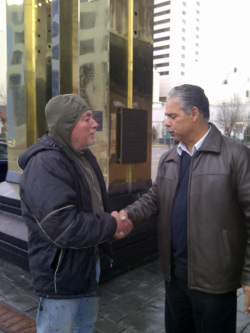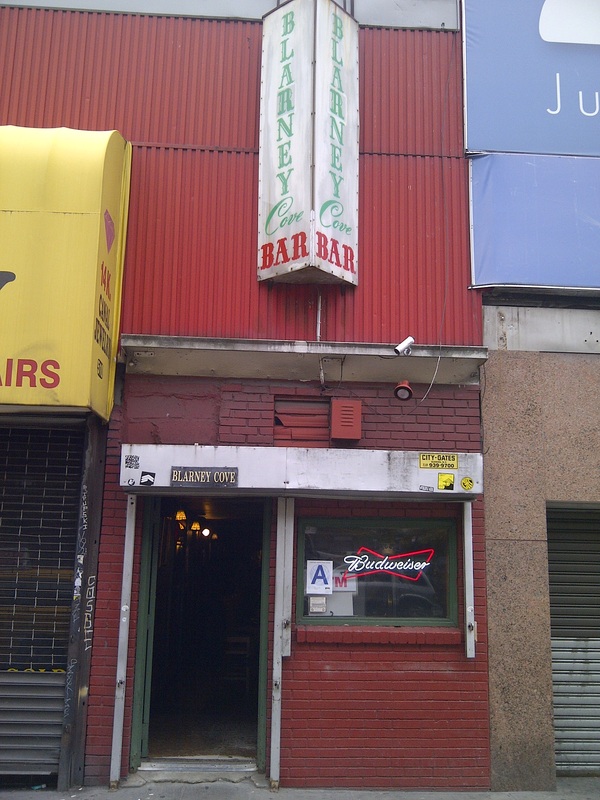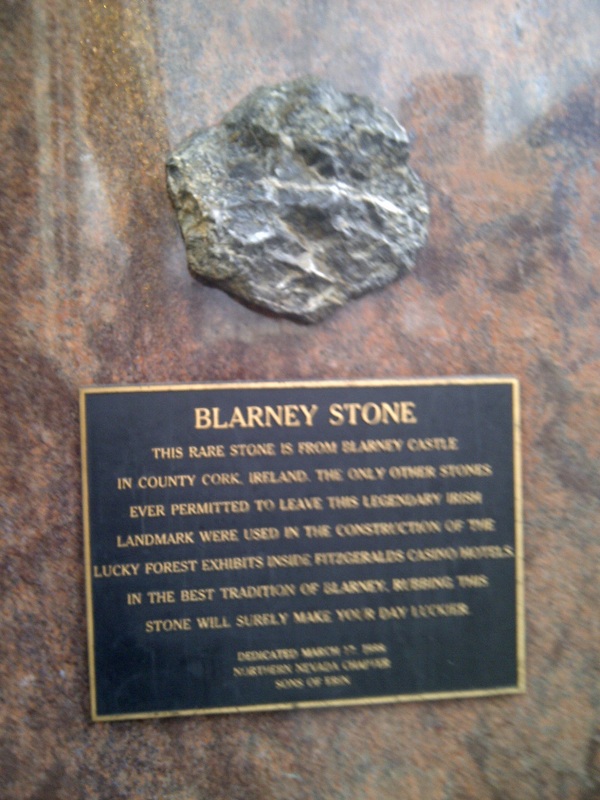Through the eyes of a stranger came love from the past

Jimmy Cunningham and Donald Rubbo,
December 5, 2012
By Cheryl Lynne Rubbo
Donald and I had been staying in New York in the fall of 2012, with Donald’s brother Thomas, in the Bronx. One day in late October we took the subway into Manhattan, and after walking around a bit, we found ourselves in the East Village. We just happened to be on East 14th Street, and Donald looked around and said, “We’re near the bar where my father died.”
Donald’s father, Don Rubbo, had a long history of heart disease, and had been near death several times, from heart attacks. Don had hazel-colored eyes, was a heavy drinker, and he had turned bitter from the many setbacks and betrayals he had experienced in his professional graphic arts career.
Born in Connecticut on December 5th, 1926, Don was Italian-Irish, and had served time in the Armed Forces during World War II. He had been in the Navy, and was stationed on Guam. Because Don had witnessed, from Guam, the testing of nuclear weapons at Bikini Atoll in the 1940’s, and had seen the mushroom clouds and had felt the powerful and unsettling shock waves from the blasts (and a year earlier had also been appalled when atomic bombs were dropped on Hiroshima and Nagasaki) he was vehemently against using atomic and nuclear weapons for any reason.
Don Rubbo passed away in January of 1979, after a long night of drinking at a neighborhood bar near his apartment. He’d been hanging out with his buddies at the bar, and when it closed at 4 am, they went to breakfast together at a nearby restaurant. At 6 am, when the bar re-opened, they all went back to have more drinks. Don said to his friends, “I’m tired now. I’m going to rest.” He put his head down on his arms, which were resting on the top of the bar, and a little while later, the bartender noticed that he wasn’t moving.
He was 52 years old.
The previous December (1978), Don had been hospitalized after suffering a massive heart attack. His doctor called Donald (who was living in California) from Don’s bedside. Don was unconscious, and the doctor told Donald that he should get to New York right away, as Don was not expected to live much longer. Donald asked the doctor to put the phone to his father’s ear, and Donald said to his father, “Dad, I’m on my way. I’ll be there as soon as I can.”
Donald arrived in New York very shortly after that phone call, and found that his father had left the hospital and had gone back to his apartment. Apparently, right after the doctor hung up the phone, Don woke up, ripped the tubes and wires out, and told his doctor, “My son is coming. I have to go home and get ready to see him.”
Donald walked into his father’s apartment and found him on his hands and knees on the floor of the bathroom, vigorously scrubbing the grout between the floor tiles with a toothbrush. Donald was horrified, and said, “Dad, what are you doing? Get off the floor! You’re sick, you’ve got to go and rest!”
Don looked up at Donald and said, “Son, I’ve got just one more lesson for you. No matter what you are doing, whether it’s creating art or scrubbing the toilet, always put your heart into the job, and do the very best you can. Make everything you do a labor of love, no matter what it is.”
That late-October day in Manhattan, in 2012, I took a photo with my cellphone of the outside of the funky neighborhood bar on
E. 14th Street where Donald’s father had died, and then didn’t think anything more about it.
During our drive in late November from New York back to the Bay Area, we did not have a set itinerary, just deciding kind of last minute which highway, Interstate 80 or Interstate 40, we would take. After we chose I-40, we took it one day a time, and let the Universe guide us.
While we were in Las Vegas, visiting with our son, Julian, we were hearing on the news about a very large storm about to hit northern California. Although we wanted to go north, and cross into California at Tahoe, we were concerned about the mountain roads closing from heavy snowfall. We discussed going West, to southern California, and then driving north up the coast to the Bay Area.
The morning we left Las Vegas, on December 4th, 2012, we stood in the parking lot of the hotel and flipped a coin. Heads for going West to the Los Angeles area, and tails for going Northwest to Reno and then into California.
Tails it was, and we got in the car. We took 95 North to 80 West, and arrived in Reno around 6:30 or 7:00 that night. While still in Las Vegas, I’d researched rates for Harrah’s Reno, about $75.00, but I hadn’t booked it as we didn’t know what city or town we’d be in that night. We parked the car on a downtown street in Reno, and sat in the car discussing finding a hotel room. Looking to our right, we saw a Vietnamese restaurant, and decided to go inside for dinner. We had the best Pho (rice noodle soup) that we’d had in a very long time.
Full and happy from finding this Pho restaurant, we got back into the car and drove to look at a couple of motels (the rooms were sleazy, dark, small, yucko, expensive $75.00/$80.00!) I got online with my cellphone, and looked at Harrah’s website. They were having a last-minute online special, $23.00 a night, for a huge 4-star room! I booked it immediately, beyond grateful for modern technology.
The next morning, we went outside the hotel to find a cup of coffee, and right at the first corner we came to, we saw a wall plaque that read, ‘Blarney Stone,’ and above the plaque a rock was set into the wall. We stopped to look at it and read the inscription, and we heard a voice behind us.
“Good morning! That’s a rather interesting rock, isn’t it?” We turned to see an older gentleman, obviously down on his luck and a street person, but since we never turn down an opportunity to connect with another human being, no matter what their circumstance, we chose to continue the conversation. We were very happy we did.
Jimmy Cunningham turned out to be a delightful man, with quite the ‘gift of gab.’ We had a wide-ranging conversation, we talked about politics, Hurricane Sandy and the storms brought on by climate changes, among many topics.
Jimmy was a Vietnam Vet, had been homeless for years, and was an admitted alcoholic. He had hazel colored, drink-reddened eyes, he was Irish-English-Italian, and had served in the Navy. He had been stationed on a nuclear submarine during the war.
Because of his experience on this nuclear submarine, he was adamant that the United States ban all nuclear weapons and close all nuclear power plants. Jimmy thought nuclear power was too dangerous, especially, he said, after what happened in Japan after the tsunami hit.
After we described the healing and transformative work we do around the world, he asked us, where did we think God was? I said to him, “Well, why don’t you tell us where you think he is.”
Jimmy replied, “God is in every molecule, in everything that is alive.” We couldn’t agree more.
As we stood there on that corner, on that cold, blustery day in early December, Donald and I both (as we later discovered) had a felt-sensation of Donald’s father, Don Rubbo, looking out at us through Jimmy Cunningham’s shiny hazel eyes.
On that cold, blustery December 5th day, in downtown Reno, in front of the Blarney Stone.
On that cold, blustery December 5th day, Don Rubbo’s birthday.
A few months later, as I was looking through the photos on my cellphone, to delete some to make room for more, I found the photo
I took on October 26th, 2012, of the dive bar on E. 14th Street, in the East Village of Manhattan, where Donald’s father had
died in 1979.
I hadn’t noticed before, the name of the bar is:
Blarney Cove.
Donald and I had been staying in New York in the fall of 2012, with Donald’s brother Thomas, in the Bronx. One day in late October we took the subway into Manhattan, and after walking around a bit, we found ourselves in the East Village. We just happened to be on East 14th Street, and Donald looked around and said, “We’re near the bar where my father died.”
Donald’s father, Don Rubbo, had a long history of heart disease, and had been near death several times, from heart attacks. Don had hazel-colored eyes, was a heavy drinker, and he had turned bitter from the many setbacks and betrayals he had experienced in his professional graphic arts career.
Born in Connecticut on December 5th, 1926, Don was Italian-Irish, and had served time in the Armed Forces during World War II. He had been in the Navy, and was stationed on Guam. Because Don had witnessed, from Guam, the testing of nuclear weapons at Bikini Atoll in the 1940’s, and had seen the mushroom clouds and had felt the powerful and unsettling shock waves from the blasts (and a year earlier had also been appalled when atomic bombs were dropped on Hiroshima and Nagasaki) he was vehemently against using atomic and nuclear weapons for any reason.
Don Rubbo passed away in January of 1979, after a long night of drinking at a neighborhood bar near his apartment. He’d been hanging out with his buddies at the bar, and when it closed at 4 am, they went to breakfast together at a nearby restaurant. At 6 am, when the bar re-opened, they all went back to have more drinks. Don said to his friends, “I’m tired now. I’m going to rest.” He put his head down on his arms, which were resting on the top of the bar, and a little while later, the bartender noticed that he wasn’t moving.
He was 52 years old.
The previous December (1978), Don had been hospitalized after suffering a massive heart attack. His doctor called Donald (who was living in California) from Don’s bedside. Don was unconscious, and the doctor told Donald that he should get to New York right away, as Don was not expected to live much longer. Donald asked the doctor to put the phone to his father’s ear, and Donald said to his father, “Dad, I’m on my way. I’ll be there as soon as I can.”
Donald arrived in New York very shortly after that phone call, and found that his father had left the hospital and had gone back to his apartment. Apparently, right after the doctor hung up the phone, Don woke up, ripped the tubes and wires out, and told his doctor, “My son is coming. I have to go home and get ready to see him.”
Donald walked into his father’s apartment and found him on his hands and knees on the floor of the bathroom, vigorously scrubbing the grout between the floor tiles with a toothbrush. Donald was horrified, and said, “Dad, what are you doing? Get off the floor! You’re sick, you’ve got to go and rest!”
Don looked up at Donald and said, “Son, I’ve got just one more lesson for you. No matter what you are doing, whether it’s creating art or scrubbing the toilet, always put your heart into the job, and do the very best you can. Make everything you do a labor of love, no matter what it is.”
That late-October day in Manhattan, in 2012, I took a photo with my cellphone of the outside of the funky neighborhood bar on
E. 14th Street where Donald’s father had died, and then didn’t think anything more about it.
During our drive in late November from New York back to the Bay Area, we did not have a set itinerary, just deciding kind of last minute which highway, Interstate 80 or Interstate 40, we would take. After we chose I-40, we took it one day a time, and let the Universe guide us.
While we were in Las Vegas, visiting with our son, Julian, we were hearing on the news about a very large storm about to hit northern California. Although we wanted to go north, and cross into California at Tahoe, we were concerned about the mountain roads closing from heavy snowfall. We discussed going West, to southern California, and then driving north up the coast to the Bay Area.
The morning we left Las Vegas, on December 4th, 2012, we stood in the parking lot of the hotel and flipped a coin. Heads for going West to the Los Angeles area, and tails for going Northwest to Reno and then into California.
Tails it was, and we got in the car. We took 95 North to 80 West, and arrived in Reno around 6:30 or 7:00 that night. While still in Las Vegas, I’d researched rates for Harrah’s Reno, about $75.00, but I hadn’t booked it as we didn’t know what city or town we’d be in that night. We parked the car on a downtown street in Reno, and sat in the car discussing finding a hotel room. Looking to our right, we saw a Vietnamese restaurant, and decided to go inside for dinner. We had the best Pho (rice noodle soup) that we’d had in a very long time.
Full and happy from finding this Pho restaurant, we got back into the car and drove to look at a couple of motels (the rooms were sleazy, dark, small, yucko, expensive $75.00/$80.00!) I got online with my cellphone, and looked at Harrah’s website. They were having a last-minute online special, $23.00 a night, for a huge 4-star room! I booked it immediately, beyond grateful for modern technology.
The next morning, we went outside the hotel to find a cup of coffee, and right at the first corner we came to, we saw a wall plaque that read, ‘Blarney Stone,’ and above the plaque a rock was set into the wall. We stopped to look at it and read the inscription, and we heard a voice behind us.
“Good morning! That’s a rather interesting rock, isn’t it?” We turned to see an older gentleman, obviously down on his luck and a street person, but since we never turn down an opportunity to connect with another human being, no matter what their circumstance, we chose to continue the conversation. We were very happy we did.
Jimmy Cunningham turned out to be a delightful man, with quite the ‘gift of gab.’ We had a wide-ranging conversation, we talked about politics, Hurricane Sandy and the storms brought on by climate changes, among many topics.
Jimmy was a Vietnam Vet, had been homeless for years, and was an admitted alcoholic. He had hazel colored, drink-reddened eyes, he was Irish-English-Italian, and had served in the Navy. He had been stationed on a nuclear submarine during the war.
Because of his experience on this nuclear submarine, he was adamant that the United States ban all nuclear weapons and close all nuclear power plants. Jimmy thought nuclear power was too dangerous, especially, he said, after what happened in Japan after the tsunami hit.
After we described the healing and transformative work we do around the world, he asked us, where did we think God was? I said to him, “Well, why don’t you tell us where you think he is.”
Jimmy replied, “God is in every molecule, in everything that is alive.” We couldn’t agree more.
As we stood there on that corner, on that cold, blustery day in early December, Donald and I both (as we later discovered) had a felt-sensation of Donald’s father, Don Rubbo, looking out at us through Jimmy Cunningham’s shiny hazel eyes.
On that cold, blustery December 5th day, in downtown Reno, in front of the Blarney Stone.
On that cold, blustery December 5th day, Don Rubbo’s birthday.
A few months later, as I was looking through the photos on my cellphone, to delete some to make room for more, I found the photo
I took on October 26th, 2012, of the dive bar on E. 14th Street, in the East Village of Manhattan, where Donald’s father had
died in 1979.
I hadn’t noticed before, the name of the bar is:
Blarney Cove.


